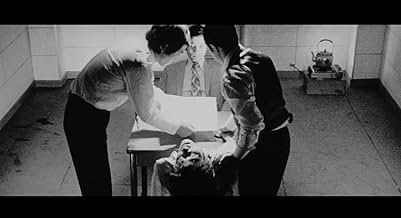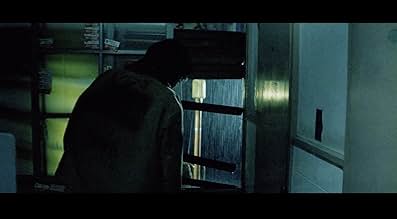IMDb RATING
6.3/10
1.8K
YOUR RATING
Once again on the lam, Matsu is helped by a strip club worker who holds a grudge against the detective who's trying to find her.Once again on the lam, Matsu is helped by a strip club worker who holds a grudge against the detective who's trying to find her.Once again on the lam, Matsu is helped by a strip club worker who holds a grudge against the detective who's trying to find her.
Featured reviews
Yasuharu Hasebe (Black Tight Killers) took over for director Shunya Ito for this, the last Female Convict Scorpion picture starring Meiko Kaji (Lady Snowblood). The film opens with Nami Matsushima (a.k.a. Matsu, a.k.a. Scorpion) once again on the lam. The police track her down at a wedding, but she manages to escape. Badly injured, she is saved by a man who works in a strip joint and holds a grudge against the police for torturing him. Can the Scorpion trust a man again? Should she?
One of the reasons Kaji decided to stop doing the Scorpion pictures is that Toei kept slashing the budget with each new installment. This film is smaller in scale and more straightforward than the first three chapters. It is easily the least of the four Scorpion films featuring Meiko Kaji; however, it is still engrossing whenever she is on the screen.
One of the reasons Kaji decided to stop doing the Scorpion pictures is that Toei kept slashing the budget with each new installment. This film is smaller in scale and more straightforward than the first three chapters. It is easily the least of the four Scorpion films featuring Meiko Kaji; however, it is still engrossing whenever she is on the screen.
The fourth and final of the brilliant original "Sasori" films with the unrivaled Meiko Kaji, "Joshuu Sasori: 701-gô urami-bushi" aka. "Female Prisoner Scorpion: 701's Grudge Song" was directed by Yasuharu Hasebe instead of genius director Shunya Ito, who had directed the three ingenious predecessors. Even this fourth "Sasori" flick does not quite reach the brilliance of its predecessors (all three of which are unique and unrivaled masterpieces of Exploitation cinema), "Grudge Song" still outshines almost any other film of the WIP ("Women In Prison") sub-genre by a thousand times. What makes this a little less brilliant than its predecessors is probably the replacement of Shunya Ito as a director. Ito had a great passion (and a great talent) for the use of surrealism, and Yasuharo Hasebe obviously preferred to use these elements to a lesser extent. The first three "Sasori" films were THE proof that making Exploitation and Art-house cinema at the same time was possible, and while "Grudge Song" still is a wonderful example of Exploitation-Art, it does not quite live up to the brilliance of the iconic original "Joshuu 701-gô: Sasori" and the ingeniously surreal sequels "Jailhouse 41" and the third masterpiece "Beast Stable", which is arguably the greatest of them all. Nevertheless, this fourth "Sasori" film is an absolute must-see for any fan of Exploitation and serious lover of film in general, that delivers pure brilliance in many aspects.
While Meiko Kaji's character Nami Matsushima aka. "Sasori" was mainly looking for revenge in the first film, the films become more and more political throughout the series. "Grudge Song" is again full of social criticism and broaches issues such as poverty, police brutality, rebellion and the death penalty. The film once again features a lot of violence, as well as very artistic elements. The beautiful Meiko Kaji once again brilliant in the role of Sasori, I just cannot praise this great actress enough. The rest of the performances are also great, and the the film once again has "Urami-Bushi", which Kaji sings, as the main theme song. The photography is also amazing, the film is visually stunning throughout its 89 minutes.
Though it doesn't quite reach the brilliance of its predecessors "Grudge Song" is definitely also an excellent slice of Exploitation-Art and a must-see for every serious lover of cult-cinema in general and J-Exploitation in particular.
While Meiko Kaji's character Nami Matsushima aka. "Sasori" was mainly looking for revenge in the first film, the films become more and more political throughout the series. "Grudge Song" is again full of social criticism and broaches issues such as poverty, police brutality, rebellion and the death penalty. The film once again features a lot of violence, as well as very artistic elements. The beautiful Meiko Kaji once again brilliant in the role of Sasori, I just cannot praise this great actress enough. The rest of the performances are also great, and the the film once again has "Urami-Bushi", which Kaji sings, as the main theme song. The photography is also amazing, the film is visually stunning throughout its 89 minutes.
Though it doesn't quite reach the brilliance of its predecessors "Grudge Song" is definitely also an excellent slice of Exploitation-Art and a must-see for every serious lover of cult-cinema in general and J-Exploitation in particular.
Grudge Song, Meiko Kaji's final outing as sexy female prisoner Nami Matsushima (AKA The Scorpion), opens with our beautiful anti-hero narrowly avoiding capture by the police during a wedding. Badly injured during this latest escape, our tasty fugitive breaks into a strip club where she is tended to by club employee Teruo Kudo (Masakazu Tamura), who bears a grudge against the police for torturing him when he was younger.
Grateful for his kindness, and recognising Kudo as a kindred spirit, Nami lowers her defenses and forms a relationship with the young man—but can Kudo be trusted not to betray Nami, especially when he is put under pressure by sadistic policeman Kodama (Yumi Kanei) and his brutal cohorts?
After being somewhat disappointed by director Shunya Ito's third Female Prisoner movie, Beast Stable, which I believe lacked the effortlessly cool vibe of the first two films and saw the formula becoming somewhat tired, I was excited to see that this fourth chapter for Meiko Kaji's cult character was directed by Yasuharu Hasebe, the man responsible for such delightfully depraved Pinku classics as 'Assault! Jack the Ripper' and 'Rape! 13th Hour'. Surely this guy could inject some new life into the series.
Unfortunately, Grudge Song proves to be a rather restrained affair from Hasebe, one that features little of the shocking sexual and violent content that I would normally associate with the director's work, with even the film's nastiest scene, a gang-rape, lacking his usual impact (possibly suggesting that the director was holding himself back, compelled to try and be as stylish and classy as his predecessor when dealing with such a well established franchise). Hasebe also unwisely turns Kaji's Nami into a much less sympathetic character than before, making it harder for the audience to care about her fate.
Had Hasebe given Grudge Song the same outrageous, exploitative approach that made his aforementioned titles such deviant guilty pleasures, this would have been a lot more fun, and a great way for Kaji to leave the series. Sadly, as it is, this one is my least favourite of all the Female Scorpion films.
5.5 out 10, rounded up to 6 for IMDb.
Grateful for his kindness, and recognising Kudo as a kindred spirit, Nami lowers her defenses and forms a relationship with the young man—but can Kudo be trusted not to betray Nami, especially when he is put under pressure by sadistic policeman Kodama (Yumi Kanei) and his brutal cohorts?
After being somewhat disappointed by director Shunya Ito's third Female Prisoner movie, Beast Stable, which I believe lacked the effortlessly cool vibe of the first two films and saw the formula becoming somewhat tired, I was excited to see that this fourth chapter for Meiko Kaji's cult character was directed by Yasuharu Hasebe, the man responsible for such delightfully depraved Pinku classics as 'Assault! Jack the Ripper' and 'Rape! 13th Hour'. Surely this guy could inject some new life into the series.
Unfortunately, Grudge Song proves to be a rather restrained affair from Hasebe, one that features little of the shocking sexual and violent content that I would normally associate with the director's work, with even the film's nastiest scene, a gang-rape, lacking his usual impact (possibly suggesting that the director was holding himself back, compelled to try and be as stylish and classy as his predecessor when dealing with such a well established franchise). Hasebe also unwisely turns Kaji's Nami into a much less sympathetic character than before, making it harder for the audience to care about her fate.
Had Hasebe given Grudge Song the same outrageous, exploitative approach that made his aforementioned titles such deviant guilty pleasures, this would have been a lot more fun, and a great way for Kaji to leave the series. Sadly, as it is, this one is my least favourite of all the Female Scorpion films.
5.5 out 10, rounded up to 6 for IMDb.
Nami Matsushima, the Scorpion, still on the run from Kodama, meets Yasuo. Together they try to exact revenge on the corrupt detective, but when things go awry, Nami is back in prison and has to find a way to escape before being hanged.
Meiko Kaji returned to play the title role, but director Shunya Ito was replaced by Yasuharu Hasebe (1932-2009). Hasebe was more controversial, and is best known for his movies in the "violent pink" subgenre of the Pink film, such as "Assault! Jack the Ripper" (1976), and the provocatively-titled "Rape!" (1976), "Rape! 13th Hour" (1977) and "Raping!" (1978). Take from that what you will.
Because of the change in director, some people do not consider this to be a "full" sequel in the Scorpion series, despite the lead actress returning. I have no opinion on that one way or the other.
Meiko Kaji returned to play the title role, but director Shunya Ito was replaced by Yasuharu Hasebe (1932-2009). Hasebe was more controversial, and is best known for his movies in the "violent pink" subgenre of the Pink film, such as "Assault! Jack the Ripper" (1976), and the provocatively-titled "Rape!" (1976), "Rape! 13th Hour" (1977) and "Raping!" (1978). Take from that what you will.
Because of the change in director, some people do not consider this to be a "full" sequel in the Scorpion series, despite the lead actress returning. I have no opinion on that one way or the other.
This begins well enough and has enough going on, a male helper this time, to maintain the interest until the most exciting scenes come along. It is a good idea that Meiko's seeming saviour here has had history with the police already from his days of 60s student rebellion. Flashbacks enable stand-in director Hasebe to double his violent police demonstrations with current and b/w past. This is number four in the series, however, and needed more not less in the way of interesting action and visuals. Gone are the stylish sequences and gone the surrealism. The endings, both false and actual are fun and if this is a disappointment it is no disgrace and while not the greatest of finales, probably a much better fourth episode than many might have expected. Worth seeing.
Did you know
- ConnectionsFeatured in Yutaka Kohira: Scorpion Old and New (2016)
- How long is Female Prisoner Scorpion: #701's Grudge Song?Powered by Alexa
Details
- Release date
- Country of origin
- Language
- Also known as
- Female Prisoner Scorpion: #701's Grudge Song
- Production company
- See more company credits at IMDbPro
Contribute to this page
Suggest an edit or add missing content












